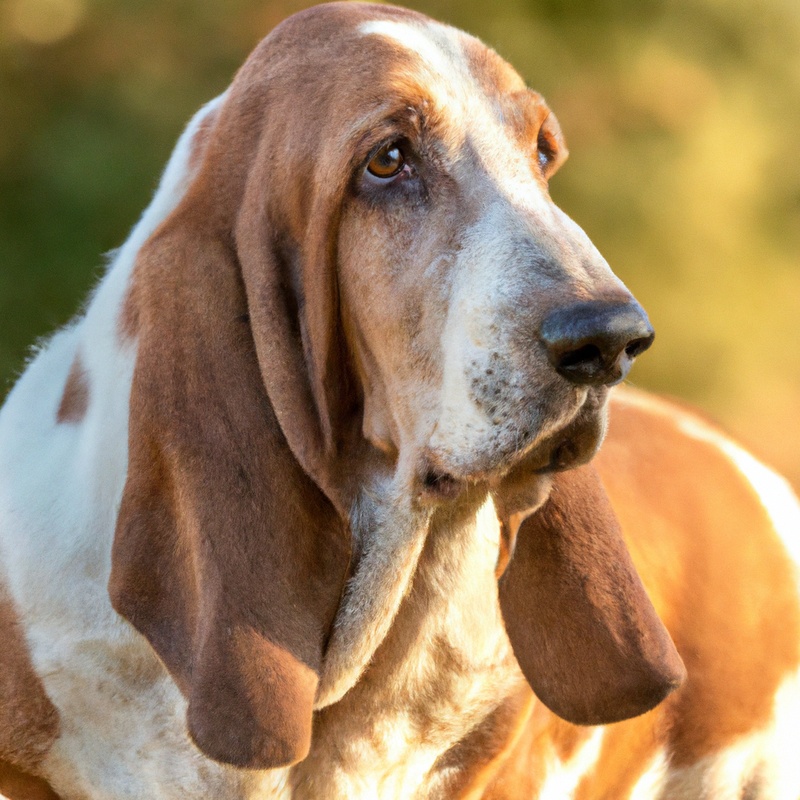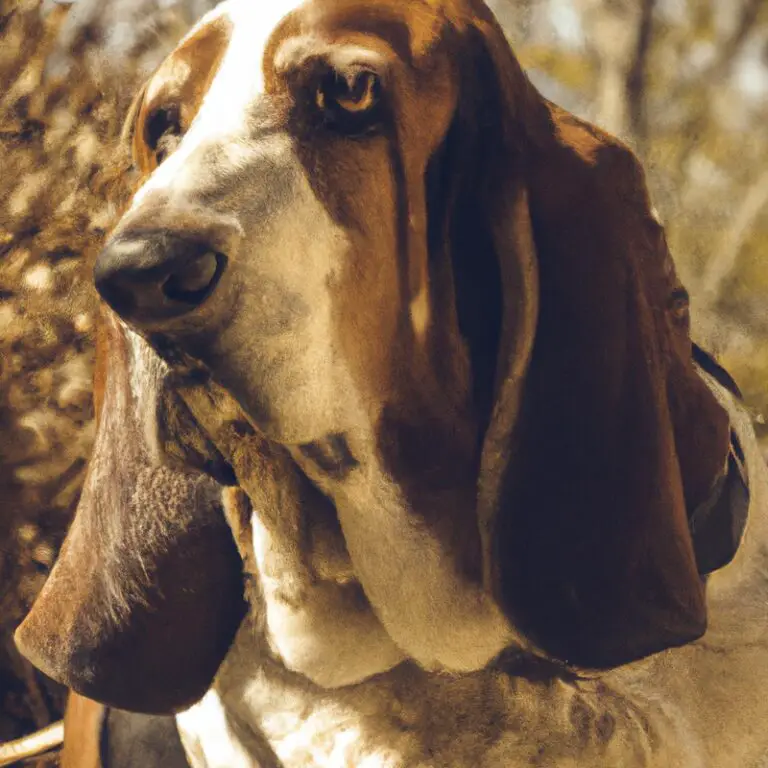Do Basset Hounds Have a Strong Sense Of Pack Loyalty?
Key Takeaways:
- Basset Hounds exhibit a strong sense of pack loyalty due to their breeding history as scent hounds.
- Their loyalty extends to their human family members and they thrive on companionship and being part of a pack.
- Basset Hounds may become anxious or exhibit separation anxiety if left alone for long periods of time.
- Proper socialization and training can help reinforce their pack loyalty and prevent potential behavioral issues.
Imagine having a furry companion who is not only your best friend but also fiercely loyal and devoted to you. Enter the world of Basset Hounds, an endearing breed known for their droopy ears and long bodies.
But do these lovable dogs possess a strong sense of pack loyalty?
As an expert on canine behavior, I’ll delve into the origins and temperament of Basset Hounds to shed light on their social behavior. We’ll explore what pack loyalty means for dogs, the factors influencing it, and how Basset Hounds fit into this picture.
Stay tuned to uncover the secrets of these lovable dogs and their bond with their human pack!
| Question | Answer |
| Do Basset Hounds have a strong sense of pack loyalty? | Yes |
| Are Basset Hounds good family pets? | Yes |
| Are Basset Hounds easy to train? | No |
The Nature of Basset Hounds
Origins of Basset Hounds
Basset Hounds have a fascinating origin story.
They were first bred in France in the late 16th century, specifically for hunting small game, like rabbits and hares.
With their low-slung bodies, droopy ears, and excellent sense of smell, Basset Hounds were well-suited for tracking game in dense foliage.
Their unique appearance and hunting abilities quickly gained popularity, and they spread to other parts of Europe and eventually to America.
Today, Basset Hounds are cherished as loyal companions and family pets.

Physical Characteristics of Basset Hounds
Basset Hounds have distinct physical characteristics that set them apart from other dog breeds. They are known for their long, droopy ears and their wrinkled skin.
Their short legs and heavy, low-set bodies give them a unique and lovable appearance.
Basset Hounds also have a keen sense of smell due to their well-developed noses. Another characteristic of Basset Hounds is their loose, hanging skin, especially around their face and neck.
Overall, these physical traits contribute to the charm and iconic look of Basset Hounds.
Temperament of Basset Hounds
Basset Hounds have a unique temperament characterized by their gentle, laid-back nature. They are known to be friendly, affectionate, and easygoing dogs.
Bassets are generally quite calm and not easily provoked, making them great companions for families and individuals alike.
They tend to get along well with other pets and children, showing a patient and tolerant attitude. Basset Hounds are also known for having a curious and sometimes stubborn streak, which can make training challenging at times.
However, with patience and consistent positive reinforcement, they can be trained to be well-behaved and obedient pets.
Social Behavior of Basset Hounds
Basset Hounds are known for their friendly and sociable nature. They enjoy being around people and other animals, making them great companions.
These dogs thrive in a social environment and are generally well-behaved and easygoing.
They often get along well with other dogs and pets, and are generally friendly with strangers. Basset Hounds love attention and affection, and they are not typically aggressive or territorial.
However, it’s important to remember that individual behavior may vary, and proper socialization and training are key to ensuring a well-adjusted and socially adept Basset Hound.
Understanding Pack Loyalty
Definition of Pack Loyalty in Dogs
Pack loyalty in dogs refers to their strong bond and commitment to their pack or social group.
It is a deep sense of connection and loyalty that dogs have towards their pack members, whether they are other dogs or humans.
Pack loyalty is characterized by cooperation, protection, and the desire to stay together.
Dogs with strong pack loyalty exhibit behaviors such as sticking together, defending each other, and sharing resources.
This loyalty is instinctual and stems from their evolutionary history as pack animals.
Dogs with a strong sense of pack loyalty are often known to be more cooperative, obedient, and loving towards their pack members.
Importance of Pack Loyalty
Pack loyalty is crucial for the well-being and survival of dogs. It fosters a sense of security and belonging within the group.
With strong pack loyalty, dogs feel protected and are more likely to cooperate and work together.
It also helps in building trust and communication among pack members. Dogs who are loyal to their pack are more likely to stay close and not wander off.
This loyalty promotes social bonding and contributes to the overall happiness and stability of the group.

Factors Influencing Pack Loyalty
Factors influencing pack loyalty in Basset Hounds include:
- Breed instincts: Basset Hounds have a natural inclination to be part of a pack and are known for their loyalty.
- Socialization: Early exposure to different people, animals, and environments can help Basset Hounds develop strong pack loyalty.
- Training methods: Positive reinforcement and consistency in training can strengthen the bond between the dog and its pack.
- Individual personality: Each Basset Hound may have its unique personality traits that can influence its level of pack loyalty.
- Human interaction: Regular interaction, bonding activities, and positive experiences with their human family members can foster pack loyalty in Basset Hounds.

Basset Hounds and Pack Loyalty
Instinctual Traits of Basset Hounds
Basset Hounds have several instinctual traits that are important to understand.
They are known for their exceptional sense of smell, which is a result of their strong instincts as scent hounds.
Bassets also have a natural instinct to track scents and follow them, making them excellent hunting companions.
Additionally, Basset Hounds have a stubborn streak, which can sometimes make training a challenge.
However, they are also very loyal and have a natural desire to please their owners.
Understanding these instinctual traits can help owners better care for and train their Basset Hounds.
Basset Hounds as Pack Animals
Basset Hounds have a natural inclination towards pack behavior. They were originally bred for hunting in packs, which has instilled in them a strong sense of socialization and cooperation.
Bassets are known for forming close bonds with their human and canine family members, making them excellent pack animals.
They thrive in a social environment and enjoy being a part of a pack. Whether it’s with other dogs or their human companions, Basset Hounds exhibit pack loyalty and will often seek out the company of their pack members.
This makes them a great choice for people looking for a loyal and sociable companion.
Bonding and Attachment in Basset Hounds
Basset Hounds are known to have a strong sense of bonding and attachment.
They form strong emotional connections with their owners and family members.
These dogs thrive on companionship and love being part of a pack.
Bassets will often follow their loved ones around the house, seeking attention and affection.
They may even show signs of separation anxiety if left alone for extended periods.
Building a strong bond with your Basset Hound is essential for their well-being and happiness.
Regular interaction, positive reinforcement, and spending quality time together can help strengthen the bond between you and your Basset.
Training and Pack Loyalty in Basset Hounds
Training Methods for Strengthening Pack Loyalty
To strengthen pack loyalty in Basset Hounds, there are several effective training methods you can use. First, focus on positive reinforcement by rewarding desired behaviors with treats or praise.
Consistency is key, so establish clear rules and boundaries and stick to them.
Regular exercise and socialization with other dogs can also help foster a strong sense of pack loyalty. Finally, provide mental stimulation through interactive toys and games to keep your Basset Hound engaged and mentally fulfilled.
With patience and dedication, you can build and maintain a strong bond with your furry companion.
Common Challenges in Training Basset Hounds
Training Basset Hounds can pose some unique challenges. Here are a few common difficulties you may encounter:
- Stubbornness: Basset Hounds are known for their independent nature, which can make them resistant to training. Patience and consistency are key when working with these dogs.
- Distractions: Bassets have a keen sense of smell and can easily become distracted by scents and sounds in their environment. This can make it challenging to keep their attention during training sessions.
- Slow Progress: Bassets are not the quickest learners and may require more time and repetition to grasp commands compared to other breeds. It’s important to be patient and persistent when training them.
- Selective Hearing: Basset Hounds have a reputation for selective hearing. They may choose to ignore commands if they aren’t motivated or if they find something more interesting. Finding the right motivators and rewards can help overcome this challenge.
- Separation Anxiety: Bassets tend to develop strong attachments to their owners and can experience separation anxiety. This may lead to behavioral issues if not addressed properly during training.
- Leash pulling: Basset Hounds have a strong sense of smell, which can cause them to pull on the leash while on walks. Training them to walk politely on a leash can take time and consistency. Using positive reinforcement techniques can be helpful in curbing this behavior.
It’s important to remember that every dog is unique and may have individual training challenges. Remaining patient, consistent, and utilizing positive reinforcement techniques can help overcome these hurdles and build a strong bond with your Basset Hound.
Tips for Building and Maintaining Pack Loyalty in Basset Hounds
To build and maintain pack loyalty in Basset Hounds, consistent training and positive reinforcement are key. Here are a few tips:
- Establish yourself as the leader by setting clear boundaries and rules.
- Engage in regular socialization activities, such as dog parks or playdates, to expose your Basset Hound to different dogs and people.
- Use reward-based training methods, such as treats and praise, to reinforce good behavior.
- Spend quality time bonding with your Basset Hound through activities like walks, games, and training sessions.
- Provide mental stimulation through puzzle toys and interactive games to keep your Basset Hound mentally engaged.
- Practice patience and consistency, as building pack loyalty takes time and effort.
By incorporating these tips into your training routine, you can strengthen pack loyalty and develop a strong bond with your Basset Hound.
Signs of Strong Pack Loyalty in Basset Hounds
Behaviors Demonstrating Pack Loyalty
Pack loyalty in Basset Hounds can be observed through various behaviors.
Some of these include staying close to the pack, displaying protective behaviors towards other pack members, showing excitement upon reunion, and actively seeking out social interactions with other pack members.
Another indicator is their willingness to follow the pack leader’s commands and respond to their cues.
These behaviors demonstrate the strong bond and loyalty that Basset Hounds have towards their pack, making them excellent companions and family pets.
Benefits of Strong Pack Loyalty
A strong pack loyalty in Basset Hounds brings various benefits. Firstly, it enhances their sense of security and well-being, knowing they are part of a close-knit group.
This bond promotes a deeper level of trust and communication between the dog and their human family.
Secondly, strong pack loyalty encourages a heightened level of obedience and cooperation from the Basset Hound, making them more responsive to training and commands. Lastly, it fosters a sense of companionship and emotional support, as the dog feels a strong connection and devotion to their pack members.
Recognizing and Appreciating Pack Loyalty in Basset Hounds
Recognizing and appreciating pack loyalty in Basset Hounds is important for building a strong bond with your furry friend.
Look for behaviors such as staying close to their pack members, following commands without hesitation, and displaying protective instincts.
Basset Hounds may also show affection and seek physical contact, which is a sign of their loyalty.
Remember to reward and praise their loyalty to strengthen the bond even further.
Final Verdict
As an expert in canine behavior, I can confidently say that Basset Hounds do indeed have a strong sense of pack loyalty. This loyalty is deeply rooted in their genetic makeup and is a key part of their temperament.
Bassets are known to form strong bonds with their human and animal family members, and they thrive in an environment that values and nurtures these connections.
Understanding and cultivating pack loyalty in Basset Hounds is crucial for their overall well-being and happiness. Through proper training, bonding activities, and consistent care, you can strengthen the pack loyalty of your Basset Hound and enjoy the benefits of a close and devoted companion for many years to come.







